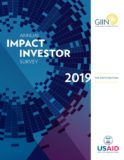The Global Impact Investing Network (GIIN) published the ninth edition of its Annual Impact Investor Survey, the most comprehensive overview of the current global impact investing market. Comprising data and insights from 266 of the world’s leading impact investors, the report provides indepth analysis of market activity and trends, covering topics such as: capital allocations by sector, geography, and instrument, indicators of market growth, industry challenges, impact measurement and management, financial and impact performance, and more. Additionally, this year’s report provides new data on key market topics, including human resources; diversity, equity, and inclusion; and the role of government and policy.
Amit Bouri, CEO and co-founder of the GIIN, said, “Global challenges like entrenched inequality and climate change require large-scale, urgent action, and impact investors are stepping up to help fuel positive progress. They are accounting for considerations that have long been ignored in the financial sector—the impact of investments and businesses on people and the planet.” He continued, “Our research shows that the growth of impact investing has largely been fueled by client demand, which demonstrates the powerful potential for people to influence positive change in the financial system.”
Sapna Shah, Managing Director at the GIIN, said, “This year’s Annual Impact Investor Survey shows our industry is increasingly sophisticated. We are starting to overcome challenges that used to stop conversations before they started, such as the misperception that financial trade-offs are necessary across all impact investment strategies. Fully one-third of survey respondents are motivated to make impact investments because of – not in spite of – their financial return potential. This shows investors increasingly see alignment between business objectives and transformative impact.”
Some key findings from this year’s survey report include:
- The impact investing industry is diverse. Survey respondents represent a variety of investor types, including fund managers, foundations, banks, development finance institutions, family offices, pension funds, and others. A majority of the investors are headquartered in developed markets; assets are allocated globally, with about half invested in emerging markets. Respondents also allocate across a variety of sectors, with the greatest share allocated to energy (15%), microfinance (13%), and other financial services (11%).
- The impact investing market continues to grow and mature. Collectively, respondents manage USD 239 billion in impact investing assets (nearly half of the total impact investing market, as measured by AUM). A subset of 80 investors that contributed to the Annual Survey both four years ago and this year grew their assets at a compound annual growth rate of nearly 17%- -a signal that the market is not only growing through new investors entering the market, but also due to increasing assets under management from those already in the market.
- Impact measurement and management (IMM) is central to investors’ goals and practices. Respondents nearly universally measure and manage their impact, typically using a mix of qualitative information, proprietary metrics, and metrics aligned to IRIS or other standard frameworks. More than 60% of investors track their investment performance to the United Nations’ Sustainable Development Goals, driven by a desire to integrate into a global development agenda.
- Impact investors report performance in line with both financial and impact expectations. A clear majority of respondents indicated that their investments have met or exceeded their expectations for impact (98%) and financial (91%) performance. Respondents also reported their average gross realized returns since inception. The distribution of returns data suggests that fund and investment selection is key.
- Impact investors indicate a strong commitment to developing the industry. Investors largely recognize their role in contributing to broader field-building efforts and industry development. For example, over 80% of respondents indicated contributing toward the various actions recommended in the GIIN’s Roadmap for the Future of Impact Investing. Respondents further view the impact investing industry as playing a key role in driving broader shifts in investment practice by changing mindsets about the fundamental purpose of finance in society and promoting diversity, equity, and inclusion through their policies and practices.
This report is made possible by the support of the American People through the United States Agency for International Development (USAID). The contents of this report are the sole responsibility of the Global Impact Investing Network (GIIN) and do not necessarily reflect the views of USAID or the United States Government.




